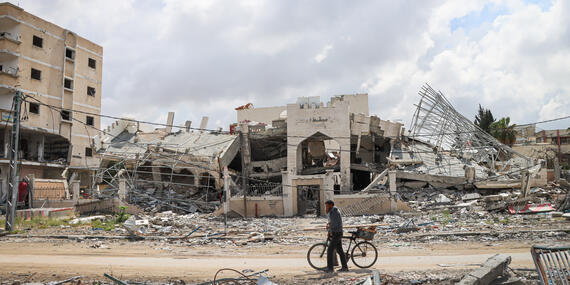Today's top news: Occupied Palestinian Territory, Ukraine, Sudan

Occupied Palestinian Territory
In Gaza, OCHA's humanitarian partners report that, as of yesterday, fewer than 5,300 patients out of more than 9,800 requiring medical evacuations had their requests approved by Israeli authorities.
Meanwhile, the overwhelming number of conflict-related injuries in Gaza has strained evacuation resources, with injuries being prioritized over chronic illnesses such as kidney failure and heart diseases.
Humanitarian partners report that in some cases, children in urgent need of kidney dialysis have died while awaiting evacuation.
Our colleagues from UNRWA warn that the risk of diseases spreading is high in Gaza, noting alarming rates of diarrhea and Hepatitis A. In Rafah, where about 1.5 million displaced people are living, trash is building up between make-shift shelters, heightening the sanitation and hygiene crisis.
UNRWA says access to fresh water is also very limited, posing a growing threat to public health, particularly as temperatures in Gaza start to rise.
Ukraine
OCHA reports that several civilians were injured, while homes and railway infrastructure sustained damage in an attack on the town of Smila in the Cherkasy Region, in the centre of Ukraine.
Aid workers are on-site, providing emergency response, including support to repair windows and damage to homes.
Meanwhile, our humanitarian colleagues warn that intensified hostilities have slowed down the delivery of aid to the front-line towns of Chasiv Yar and Khasnohorivka in the Donetsk Region, where several thousand civilians continue to live amidst ongoing hostilities and disrupted access to critical services.
Sudan
The Assistant Secretary-General for Humanitarian Affairs, Joyce Msuya, and the Special Representative of the Secretary General on Sexual Violence in Conflict, Pramila Patten, today appealed for more international engagement to combat sexual violence against women and girls in the country.
In a joint statement, the two officials warned that after one year of war in Sudan, allegations of rape, forced marriage, sexual slavery, and the trafficking of women and girls continue to be recorded – especially in the capital Khartoum, as well as Darfur and Kordofan.
As members of the Security Council meet this week for the annual open debate on conflict-related violence, Msuya and Patten urged them to send an unequivocal message: Under international humanitarian law, civilians in Sudan must be protected, and must never be subjected to acts of sexual violence, which constitute war crimes.
